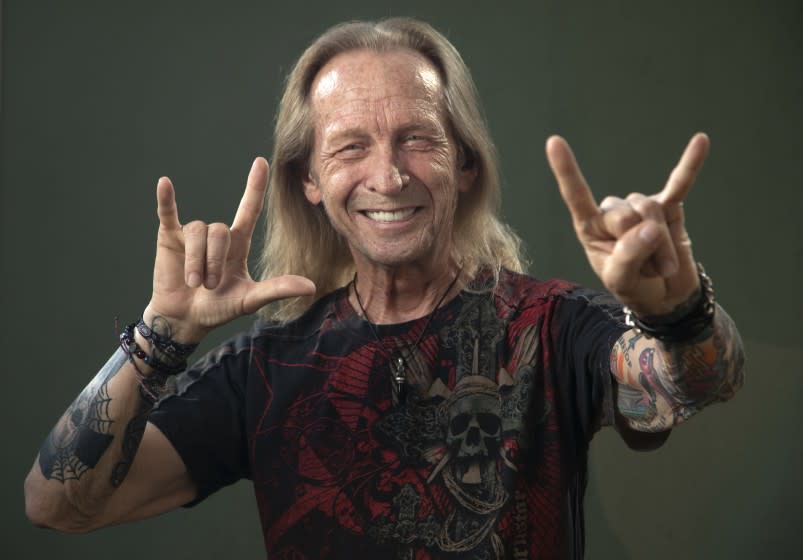As the sober-living for the deaf leader, Paul Raci breaks through in 'Sound of Metal'

- Oops!Something went wrong.Please try again later.
- Oops!Something went wrong.Please try again later.
If ever art imitated life, it was the selection of Paul Raci to play Joe, the guru-like leader of a sober house for the deaf, in director-cowriter Darius Marder’s acclaimed drama “Sound of Metal.”
Raci, 72, cut his teeth in the Chicago theater scene, has performed in many plays at L.A.’s famed Deaf West Theatre and has been seen on such TV shows as “Parks and Recreation, “Goliath” and “Baskets.” But it’s his experience growing up with two deaf parents, his lifelong involvement with the deaf community and fluency in American Sign Language that caught the attention of Marder once he widened his casting search from initially deaf-only actors to CODAs (Children of Deaf Adults) such as Raci.
Also like Joe, Raci is a Vietnam vet who overcame addiction, has led recovery groups for the deaf and, like the film’s suddenly deaf protagonist, Ruben (Riz Ahmed), plays in a heavy metal band. The part couldn’t be a more perfect fit.
The Envelope recently spoke with Raci by phone from his Burbank home about these parallels and the attention he’s been receiving for his fine performance, which has included supporting actor prizes from the National Society of Film Critics and the National Board of Review, as well an Independent Spirit Award nomination.
Darius Marder said that the most important thing he learned while making the film was that “not everyone considers deafness a disability.” It’s also one of the themes expressed in the film by your character. Can you talk a bit about the split in deaf culture between those who embrace being deaf and those, like Ruben, who want to change or fix it?
There does seem to be a divide between “Leave me alone, I’m perfect the way I am” and “If you want to go ahead and do it [get cochlear implants] go ahead and try it.” That’s all Joe’s trying to tell Ruben [when he decides to have the ear surgery], even though Joe’s really heartbroken at that decision.
But the deaf community in 2021 is far more accepting of including everybody in the tent. Deaf people have also become empowered to believe that they are leading their own destiny and they’re not going to let some hearing person tell them how to think about themselves or what they’re capable of doing. I wish my parents could be alive today to see that shift in attitudes.
The lesson for all of us, I think, is you can’t really judge another man or woman’s journey.
Were there any things that you, as a member of the deaf community, brought to your character or the film that were not specifically scripted?
Darius told me from the get-go, “Look, I’m not Shakespeare, so if you feel something’s not right, let me know.” There are a few lines in the movie that were not written, like when Joe tells Ruben … about the bomb that deafened him in Vietnam: “I still remember the music I was listening to when that bomb went off.” That was an improv line, and it comes from my mother, who still remembered music [from before losing her hearing at 5].
And if you look at the film, you’ll see the way Joe walks up stairs … how I had to pull myself up by the banister. That’s my dad. My dad, being stone deaf, had a lot of balance problems, especially at night, and walking up stairs was like a perilous journey. There are so many little subtle things that influenced me.
Is there a difference in attitudes between someone born deaf or deaf from a very early age versus someone, like Joe or Ruben, who has lived much or most of their life with full hearing?
The difference is huge. Look at the difference between my [born-deaf] dad, with his peaceful acceptance of who he was and his deaf world, and my mom, who remembered hearing. The older she got the more deaf she became, and she was like, “F— this; I don’t want to do this.” Now for somebody like Ruben, it’s a tough road to hoe, man, really hard. A guy like Joe: really hard.
Despite your lifelong history with deaf culture, did you learn anything new about the deaf community or about yourself from playing Joe?
I can’t say I learned anything new, except there was a reinforcement of realizing how empowered deaf people are and how many deaf actors are out there that need a break. [It also] reinforced my knowledge about [how] any deaf person, if you make an attempt to communicate with them, to be present with them with your eyes … to do a little gesturing or learn a sign language phrase — oh, God, that just opens the gate. They’ll be your best friend. They want to be in touch with hearing culture; they want to have a relationship with you.
I was just gratified [by it all]. I knew we were doing something good, and the result speaks for itself. If you could have seen Riz on the set, how into the deaf community he was and how open he was, it was a beautiful thing to watch.
What has it been like to suddenly be the focus of so much attention after spending 40 years as a journeyman actor?
To be in the middle of this right now, it’s overwhelming and gratifying. I think it’s just added about 20 years to my life, because I’m feeling like a very young man right now.
This story originally appeared in Los Angeles Times.

